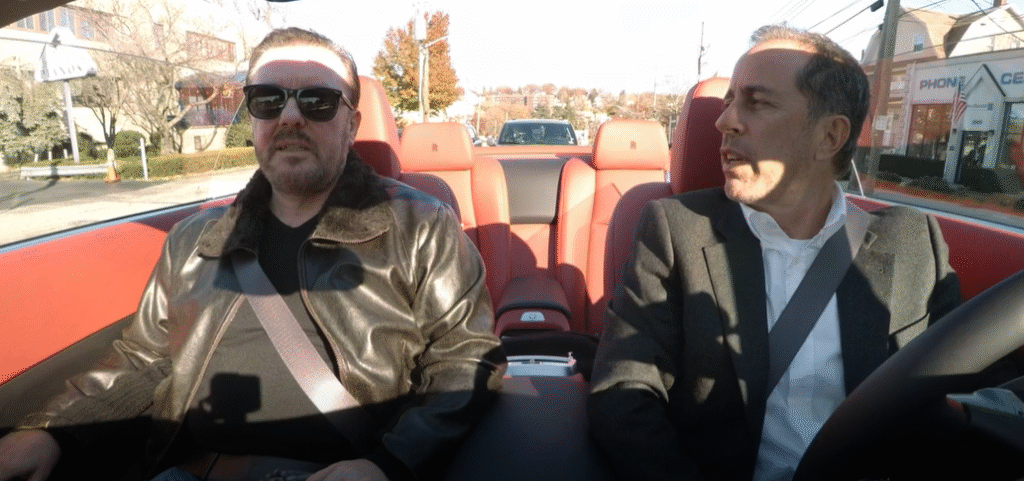Comedians in Cars Getting Coffee felt remarkably inventive in its simplicity when it debuted in 2012: coffee, vintage cars, comedians, and informal conversations. The idea was deceptively simple, but it was incredibly successful at drawing viewers into discussions that combined humor and introspection. The project became another cultural landmark for Jerry Seinfeld, who is already among the most financially successful comedians in the world. However, a legal battle simmered in the background, raising the awkward question of who actually owned the concept.
Christian Charles, a British director who had collaborated with Seinfeld since the mid-1990s, was the one who filed the lawsuit. Charles claimed to have pitched a concept that was almost exactly the same as Comedians in Cars Getting Coffee back in 2002. Two Stupid Guys in a Stupid Car Driving to a Stupid Town was the humorous title of his proposed project. Seinfeld allegedly rejected the concept at the time, but almost ten years later, he created his own version, which debuted on Crackle before going on to become a Netflix sensation with an estimated $750,000 per episode.
In 2018, Charles filed a lawsuit, asserting that he was the show’s author and calling for credit. He had a particularly direct influence on the pilot’s early design since he was its director in 2011. However, the court determined that his timing was fatally flawed. In 2019, Manhattan Judge Alison Nathan decided that Charles had waited too long to file because copyright disputes have a three-year statute of limitations. Regardless of its creative merit, Charles’s 2018 lawsuit was invalid due to its significant delay, as he knew in 2012 that Seinfeld had rejected his claim.
Jerry Seinfeld – Profile
| Category | Details |
|---|---|
| Full Name | Jerome Allen Seinfeld |
| Date of Birth | April 29, 1954 |
| Age | 71 (as of 2025) |
| Birthplace | Brooklyn, New York, U.S. |
| Nationality | American |
| Occupation | Comedian, Actor, Writer, Producer |
| Notable Works | Seinfeld, Comedians in Cars Getting Coffee |
| Net Worth (est.) | $950 million |
| Active Years | 1976–present |
| Family | Married to Jessica Seinfeld, three children |
| Reference | BBC – Jerry Seinfeld lawsuit coverage |

Charles only took action after realizing how profitable the series had become, according to Seinfeld’s legal team, who presented the case as opportunistic. Orin Snyder, an attorney, referred to it as “a money-grab,” highlighting the fact that Seinfeld invented the format and ought to be the only owner of it. In court, the argument was very clear: Charles had no basis to resurrect his claim years later because he was aware of the rejection in 2012.
Charles retaliated by denouncing Seinfeld’s actions as “egregious and shabby” through his attorney Peter Skolnik. He insisted that his creative fingerprints shaped the series and felt cheated after years of collaboration. It brought to light a common problem in Hollywood: after a project becomes financially successful, its collaborators—typically directors, writers, or producers—feel erased. The conflict was eerily reminiscent of past instances in music and film, where co-creators battled for credit long after their creations became well-known.
It’s almost cinematic in its irony. Many journalists subsequently referred to the lawsuit involving a show about “nothing” as “a lawsuit about nothing.” However, a particularly significant issue was hidden beneath the surface: how intellectual property is valued in contemporary entertainment. For Seinfeld, maintaining sole authorship meant more than just giving credit; it meant protecting a billion-dollar legacy that had been meticulously cultivated since Seinfeld, the 1990s phenomenon that made him famous.
The case also demonstrated how legal strategy and timing, rather than emotion, influence creative battles. Charles might have had a case based on shared authorship, but his rights were taken away because he was slow to act. It served as an incredibly resilient reminder that in Hollywood, ideas are safeguarded not only by originality but also by promptness and lucidity of law.
Comedians in Cars was more than just lighthearted banter to viewers; it was a representation of streaming culture. Simply unscripted conversations without any laugh tracks or staged sets. Tina Fey, Ellen DeGeneres, Kevin Hart, and even Barack Obama were among the celebrities Seinfeld brought on board to create a show that merged entertainment with cultural criticism. The lawsuit made people wonder how smaller project creators should defend themselves if even a format this light could lead to a multi-million dollar legal battle.
The case had a cultural impact because it mirrored ownership disputes that are common in the music industry and Silicon Valley. The frequent producer lawsuits in hip hop and the Zuckerberg-Winklevoss dispute over Facebook’s beginnings are remarkably similar. Ideas are currency, whether in comedy, technology, or music, and losing them can have disastrous financial consequences, as the Seinfeld case demonstrated.
An additional layer was added by Seinfeld’s status as one of the wealthiest comedians in the world, with $950 million earned mostly from stand-up and syndication rights. Critics found it surprising that a wealthy person would argue with an old collaborator over credit. The stakes were higher than money, though, for Seinfeld. It had to do with authorship and his brand’s consistency, which is based on the idea that he owns every humorous angle associated with his name.
The lawsuit emphasizes how brittle collaboration can be in creative industries from a societal perspective. Seeing a common narrative in Charles’ story—the gifted collaborator whose contributions are overshadowed by a star’s branding—many viewers felt especially pity for him. It serves as a reminder that, despite their glamour, the creative industries can be harsh when money and credit are involved.

